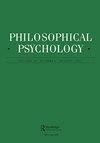社会类型学与二分法透视
IF 1.4
3区 哲学
Q2 ETHICS
引用次数: 0
摘要
摘要关于社会类型(或gsk)的泛型经常传播带有规范性力量的描述(例如,“女人是感性的”)。一些语言哲学家将此归因于gsk倾向于传递关于社会类型的本质主义信念。根据这些说法,gsk的话语暗示着社会类型的本质中存在某种东西,使他们拥有所描述的属性,因此这些社会类型的个体成员应该表现出(或被期望表现出)这些属性。在这里,我利用经验证据提出另一种说法。根据我的框架,GSK的话语暗示了所描述的社会类型与其突出的概念对立面之间的区别,产生了我所谓的二分法视角。例如,“女人是情绪化的”表明男人不是。重要的是,作为社会权力的一种功能,这种差异经常在社会共同点中持续存在,部分原因是它们与二分社会类型之间的等级社会结构相一致。这使得这样的gsk即使在缺乏本质主义信仰的情况下,也能延续注意力、期望和行为的偏见模式。关键词:通用型社会友善实用主义心理学本质主义二分法观点社会结构感谢Dan Weiskopf的持续支持,富有洞察力的对话,以及多轮耐心、周到的反馈。感谢克里斯蒂·哈特利(Christie Hartley)和安德烈·斯卡兰蒂诺(Andrea Scarantino)对论文早期草稿的有益评论和对话。披露声明作者未报告潜在的利益冲突。本文章由计算机程序翻译,如有差异,请以英文原文为准。
Social kind generics and the dichotomizing perspective
ABSTRACTGenerics about social kinds (or GSKs) frequently propagate descriptions that carry normative force (e.g., “women are emotional”). Some philosophers of language attribute this to GSKs’ tendency to transmit essentialist beliefs about social kinds. According to these accounts, utterances of GSKs implicate that there is something in the nature of social kinds that causes them to possess the properties described, and that individual members of these social kinds therefore ought to exhibit (or be expected to exhibit) these properties. Here, I draw on empirical evidence to suggest an alternative account. According to my framework, an utterance of a GSK implicates a distinction between the social kind described and its salient conceptual opposite, producing what I call a dichotomizing perspective. For example, “women are emotional” suggests that men are not. Importantly, such distinctions frequently persist in the societal common ground as a function of social power, in part due to their alignment with hierarchical social structures between dichotomized social kinds. This enables such GSKs to perpetuate biased patterns of attention, expectation, and behavior even in the absence of essentialist belief.KEYWORDS: Genericssocial kindspragmaticspsychological essentialismdichotomizing perspectivesocial structure AcknowledgementsThank you to Dan Weiskopf for the sustained support, insightful conversation, and many rounds of patient, thoughtful feedback. Thank you to Christie Hartley and Andrea Scarantino for the helpful comments and conversations about earlier drafts of the paper.Disclosure statementNo potential conflict of interest was reported by the author(s).
求助全文
通过发布文献求助,成功后即可免费获取论文全文。
去求助
来源期刊

Philosophical Psychology
Multiple-
CiteScore
2.40
自引率
14.30%
发文量
120
期刊介绍:
Philosophical Psychology is an international journal devoted to developing and strengthening the links between philosophy and the psychological sciences, both as basic sciences and as employed in applied settings, by publishing original, peer-refereed contributions to this expanding field of study and research. Published articles deal with issues that arise in the cognitive and brain sciences, and in areas of applied psychology.
 求助内容:
求助内容: 应助结果提醒方式:
应助结果提醒方式:


